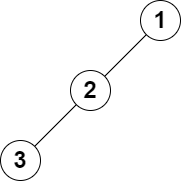LeetCode-in-Java
2583. Kth Largest Sum in a Binary Tree
Medium
You are given the root of a binary tree and a positive integer k.
The level sum in the tree is the sum of the values of the nodes that are on the same level.
Return the kth largest level sum in the tree (not necessarily distinct). If there are fewer than k levels in the tree, return -1.
Note that two nodes are on the same level if they have the same distance from the root.
Example 1:

Input: root = [5,8,9,2,1,3,7,4,6], k = 2
Output: 13
Explanation: The level sums are the following:
-
Level 1: 5. - Level 2: 8 + 9 = 17.
-
Level 3: 2 + 1 + 3 + 7 = 13.
-
Level 4: 4 + 6 = 10. The 2nd largest level sum is 13.
Example 2:

Input: root = [1,2,null,3], k = 1
Output: 3
Explanation: The largest level sum is 3.
Constraints:
- The number of nodes in the tree is
n. 2 <= n <= 1051 <= Node.val <= 1061 <= k <= n
Solution
import com_github_leetcode.TreeNode;
import java.util.ArrayList;
import java.util.Collections;
import java.util.LinkedList;
import java.util.List;
import java.util.Queue;
import java.util.Random;
/*
* Definition for a binary tree node.
* public class TreeNode {
* int val;
* TreeNode left;
* TreeNode right;
* TreeNode() {}
* TreeNode(int val) { this.val = val; }
* TreeNode(int val, TreeNode left, TreeNode right) {
* this.val = val;
* this.left = left;
* this.right = right;
* }
* }
*/
@SuppressWarnings("java:S2245")
public class Solution {
private final Random random = new Random();
public long kthLargestLevelSum(TreeNode root, int k) {
List<Long> ans = new ArrayList<>();
Queue<TreeNode> q = new LinkedList<>();
q.add(root);
while (!q.isEmpty()) {
long sum = 0;
int size = q.size();
for (int i = 0; i < size; i++) {
TreeNode curr = q.remove();
sum += curr.val;
if (curr.left != null) {
q.add(curr.left);
}
if (curr.right != null) {
q.add(curr.right);
}
}
ans.add(sum);
}
if (k > ans.size()) {
return -1;
}
k = ans.size() - k;
int start = 0;
int idx;
int end = ans.size() - 1;
while (true) {
idx = random.nextInt(end - start + 1) + start;
Long piv = ans.get(idx);
Collections.swap(ans, idx, end);
idx = start;
for (int i = start; i <= end; i++) {
if (ans.get(i) <= piv) {
Collections.swap(ans, i, idx++);
}
}
idx--;
if (idx < k) {
start = idx + 1;
} else if (idx > k) {
end = idx - 1;
} else {
break;
}
}
return ans.get(idx);
}
}

